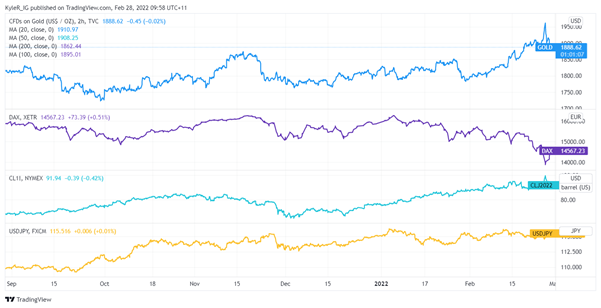Markets to open the week in a volatile fashion as Russia-Ukraine conflict escalates
Markets set for a volatile start to the week with investors fearing financial dislocation, greater shocks to growth and inflation – and even nuclear war.

Source: Bloomberg
Fresh sanctions and risk of escalation to fuel volatility
Volatility is set to continue into the new trading week. And although last week ended on a positive note, it looks unlikely that level of optimism will persist today. Fundamentally, risk-assets moved higher into the end of the week as the West avoided sanctions on Russian gas exports and left SWIFT and other financial restrictions off the table. Boots on the ground from NATO and allied nations were also largely priced out. Nonetheless, things have taken something of a turn over the weekend, even if there are reports – as difficult as they are for the average punter to verify – of Ukrainian forces wrestling back control in the conflict after Western allies moved to tighten financial sanctions on Russia and partially lock it out of SWIFT.
Some of these restrictions include the Russian central bank. In the long term, the ramifications of this could be huge. In an increasingly multipolar world, such financial warfare could push some countries away from the US Dollar and the financial system it underpins. Russian President Putin has put his nuclear forces on alert in response. In the shorter-term, it raises the spectre of significant dislocations in the financial world, especially in parts of Europe with deep connections to Russia – liquidity could be an issue – and raise the risk materially of a financial crisis in Russia that could ripple across the world.
The threat to global trade remains fluid, a potential hit to economic activity
There’s also the issue of trade. Last week’s rally in equities looked very premature, and realistically, rather than being indicative of a market efficiently and rationally discounting the future, it was more probably just a bit of headline chasing mixed with short-covering as traders ditched open positions going into the weekend. Why that may well be the case is that no one is naïve enough – in the short-term, the long-term is a different story because this too shall pass – to think this conflict is over and can’t escalate further. There remains after all the big question around gas, and other Russian exports, that could either be targeted by trade barriers from the West or be shut-off by the Russians to strangle the European economy.
Both sides remain wary of the setting of a tit-for-tat trade war and the brazen self-interest of some European countries is evident, suggesting the bar to set off such a process is high. Germany is fairly dovish in its foreign policy approach on Russia right now, although some movement came over the weekend that hinted at it was looking at other ways to secure energy security. Even more egregiously, Italy – orchestrated by Prime Minister “Super” Mario Draghi – looked to carve out exemptions for Italian luxury goods, showing that the price of Putin’s human rights abuses and war crimes is roughly that of a Gucci handbag. Or as Lenin said: “the capitalists will sell us the rope we hang them with”.
Despite hit to growth, the conflict could continue to fuel inflation
Political economy to one side, there remains the risk of greater growth and inflation shocks because of war, sanctions and the breakdown of trade. Even in the best-case scenario, trade flows will be interrupted because of this war in Ukraine. Gas and oil is one thing, there are also metals and soft commodities that will be caught up in this. There are several implications here. But the macro risk continues to be another supply shock that fuels inflationary pressures, raises bond yields, and forces central banks to tighten policy to contain (already hot) inflation. The market is still pricing in a 25% chance, based on the Fed watch tool, of hiking by 50 basis points, and a 25 basis point hike is still considered a certainty. This, at a time when global growth could end up a little weaker because of the conflict, would be a significant headwind to risk-assets and increase the momentum in this downward trend in global equities, as well as fuel another push higher in oil and gold, at least in the immediate future.




.jpeg.98f0cfe51803b4af23bc6b06b29ba6ff.jpeg)

0 Comments
Recommended Comments
There are no comments to display.
Create an account or sign in to comment
You need to be a member in order to leave a comment
Create an account
Sign up for a new account in our community. It's easy!
Register a new accountSign in
Already have an account? Sign in here.
Sign In Now